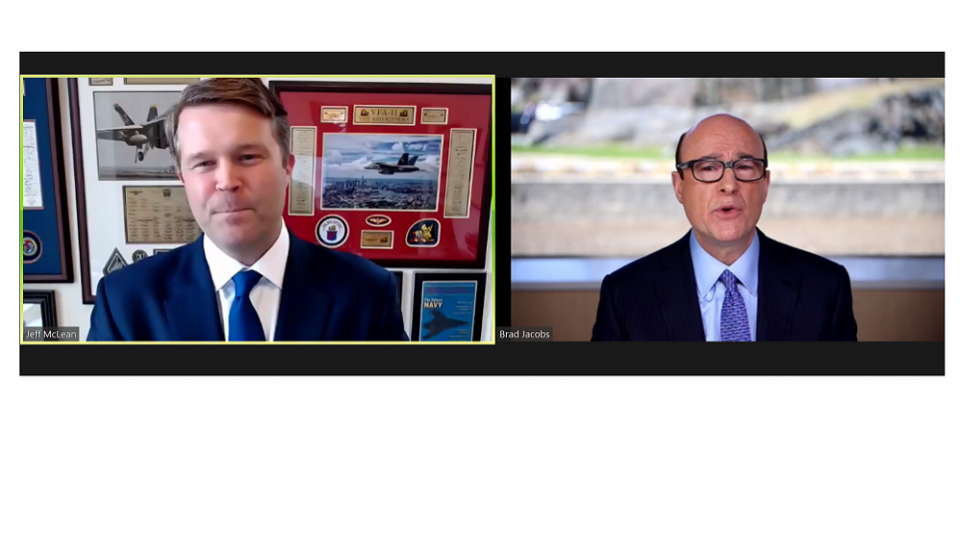XPO Logistics CEO Brad Jacobs, right, talked supply issues with moderator Jeff McLean at a webinar Wednesday.
NEW YORK — In a live webinar with the Economic Club of New York, trucking and logistics giant XPO Logistics’ CEO Brad Jacobs gave his outlook on the supply chain, covering current challenges, emerging technology and what the future holds.
“Sometimes I’ve known with a high conviction that the market is going to get better,” said Jacobs. “Other times, the evidence is so overwhelmingly clear that it’s going to get worse. This is neither of those times,” he said. “It remains unclear.”
Jacobs did reveal data points, however, that indicate the economy is slowing and that supply is recovering.
Truck load rates, or the price to transport a truck from point A to point B, are down 30% in a month. “That tells you there has been a shift in supply and demand,” he said. “There’s now significantly less demand and more supply. Prices are still elevated and healthy, but weaker than they were 30 days ago.”
He said load truck rates, or how many shipments there are for every truck, are down to four to one from 11 to one a month ago. That means an average of four shipments are now looking for a truck.
Tender rejection rates, the percentage of electronic and contracted loads rejected by carriers, are down 11% year over year and down 4% from a few months ago.
Applications for driver jobs also are up significantly, but there’s still a severe labor shortage, he said, just not as severe.
But even with all of that, Jacobs says it’s hard to predict what’s next. “We don’t know what Putin will do. We don’t know if the government will give more stimulus or if oil will go up or down.”
Another hiccup would be China taking Taiwan, Jacobs said, as much of the world relies on Taiwan for its microchips.
“Truck makers can’t make trucks unless they have chips,” he said. “Chips are a big deal. Now I do think that (the shortage) is going to get better. Manufacturers and government are developing more onshore manufacturing. But China taking Taiwan would be a huge disruption.”
Transportation and technology
Jacobs was then asked by moderator Jeff McLean about how technology is transforming the industry.
“In our business, people focus on artificial intelligence and machine learning,” he said. “It’s being used for pricing algorithms and for predicting labor. It’s the main driver of the future.”
Jacobs said the technology he predicts to have the biggest impact on the future is 3D printing, which he thinks could incentivize the economy away from globalism.
“We’re still sourcing cheap labor overseas and paying large amounts to get that product to the consumer,” he said. “You don’t need all that with 3D printing. Goods can be made in a basement.
“It may have had a slow start, but it’s going to happen,” he said. “Autonomous localized manufacturing and 3D printing will change the entire economic model.”
On artificial intelligence and self-driving trucks, Jacobs said the technology is there, but more government support is needed.
“The technology has advanced, but the regulatory side has not,” he said. “I don’t see a lot of government support on a regulatory basis for autonomous vehicles in the near future. Medium term, however, absolutely we are going that direction. Cost is much, much cheaper. Safety is higher. If foreign countries go that route and we don’t, we will be at a disadvantage.”


